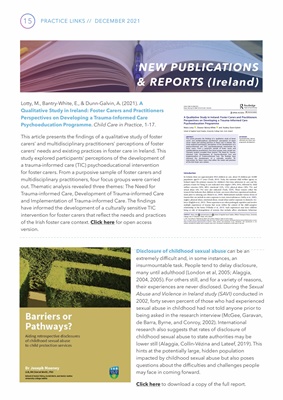
NEW PUBLICATIONS
& REPORTS (Ireland)
15 PRACTICE LINKS // DECEMBER 2021
Lotty, M., Bantry-White, E., & Dunn-Galvin, A. (2021). A
Qualitative Study in Ireland: Foster Carers and Practitioners
Perspectives on Developing a Trauma-Informed Care
Psychoeducation Programme. Child Care in Practice, 1-17.
This article presents the findings of a qualitative study of foster
carers' and multidisciplinary practitioners' perceptions of foster
carers' needs and existing practices in foster care in Ireland. This
study explored participants' perceptions of the development of
a trauma-informed care (TIC) psychoeducational intervention
for foster carers. From a purposive sample of foster carers and
multidisciplinary practitioners, four focus groups were carried
out. Thematic analysis revealed three themes: The Need for
Trauma-informed Care, Development of Trauma-informed Care
and Implementation of Trauma-informed Care. The findings
have informed the development of a culturally sensitive TIC
intervention for foster carers that reflect the needs and practices
of the Irish foster care context. Click here for open access
version.
A Qualitative Study in Ireland: Foster Carers and Practitioners
Perspectives on Developing a Trauma-Informed Care
Psychoeducation Programme
Maria Lotty , Eleanor Bantry-White and Audrey Dunn-Galvin
School of Applied Social Studies, University College Cork, Cork, Ireland
ABSTRACT
This article presents the findings of a qualitative study of foster
carers' and multidisciplinary practitioners' perceptions of foster
carers' needs and existing practices in foster care in Ireland. This
study explored participants' perceptions of the development of a
trauma-informed care (TIC) psychoeducational intervention for
foster carers. From a purposive sample of foster carers and
multidisciplinary practitioners, four focus groups were carried out.
Thematic analysis revealed three themes: The Need for Traumainformed
Care, Development of Trauma-informed Care and
Implementation of Trauma-informed Care. The findings have
informed the development of a culturally sensitive TIC
intervention for foster carers that reflect the needs and practices
of the Irish foster care context.
KEYWORDS
Psychoeducation; traumainformed
care; foster care;
programme development
Introduction
In Ireland, there are approximately 5916 children in care, about 50 children per 10,000
population aged 0-17 years (Tusla, 2019). Tusla, the national child welfare agency in
Ireland report the primary reasons for children's first-time admission to care and the
primary reason for being in care indicated were neglect (38%, 36%), followed by child
welfare concerns (36%, 40%), emotional (12%, 12%), physical abuse (10%, 7%), and
sexual abuse (4%, 3%) were also indicated (Tusla, 2019). These reasons reflect the
research that indicates that children in foster care most often have experienced maltreatment
prior to entering care (Kisiel et al., 2009). Maltreatment includes various forms of
trauma that can include in-utero exposure to toxic stress/substances (Astley et al., 2002),
neglect, physical abuse, emotional abuse, sexual abuse and/or exposure to domestic violence
(English et al., 2015). These experiences are often prolonged, repetitive and involve
multiple experiences of trauma that occur within the context of the child-caregiver
relationship in the home (Villodas et al., 2015). Such experiences may leave children
being at risk of dysregulation of systems that include; affect, attachment, behaviour
© 2021 The Author(s). Published by Informa UK Limited, trading as Taylor & Francis Group
This is an Open Access article distributed under the terms of the Creative Commons Attribution-NonCommercial-NoDerivatives License
(http://creativecommons.org/licenses/by-nc-nd/4.0/), which permits non-commercial re-use, distribution, and reproduction in any
maria.lotty@ucc.iehe original work is properly cited, and is not altered, transformed, or built upon in any way.
CONTACT Maria Lotty maria.lotty@ucc.ie School of Applied Social Studies, William Thompson House, University
College Cork, O' Donovan's Road, Cork, Ireland
CHILD CARE IN PRACTICE
https://doi.org/10.1080/13575279.2021.1925632
Disclosure of childhood sexual abuse can be an
extremely difficult and, in some instances, an
insurmountable task. People tend to delay disclosure,
many until adulthood (London et al, 2005; Alaggia,
2004, 2005). For others still, and for a variety of reasons,
their experiences are never disclosed. During the Sexual
Abuse and Violence in Ireland study (SAVI) conducted in
2002, forty seven percent of those who had experienced
sexual abuse in childhood had not told anyone prior to
being asked in the research interview (McGee, Garavan,
de Barra, Byrne, and Conroy, 2002). International
research also suggests that rates of disclosure of
childhood sexual abuse to state authorities may be
lower still (Alaggia, Collin-Vézina and Lateef, 2019). This
hints at the potentially large, hidden population
impacted by childhood sexual abuse but also poses
questions about the difficulties and challenges people
may face in coming forward.
Click here to download a copy of the full report.